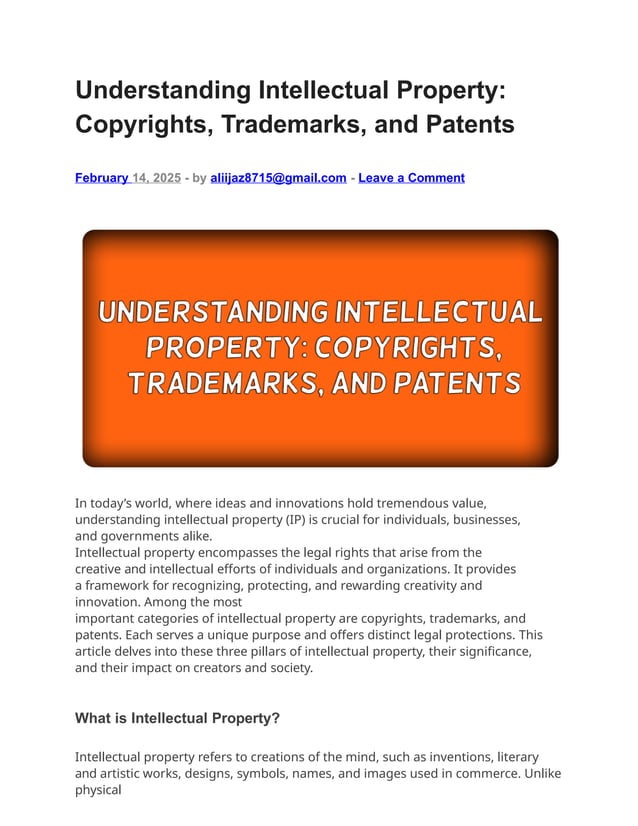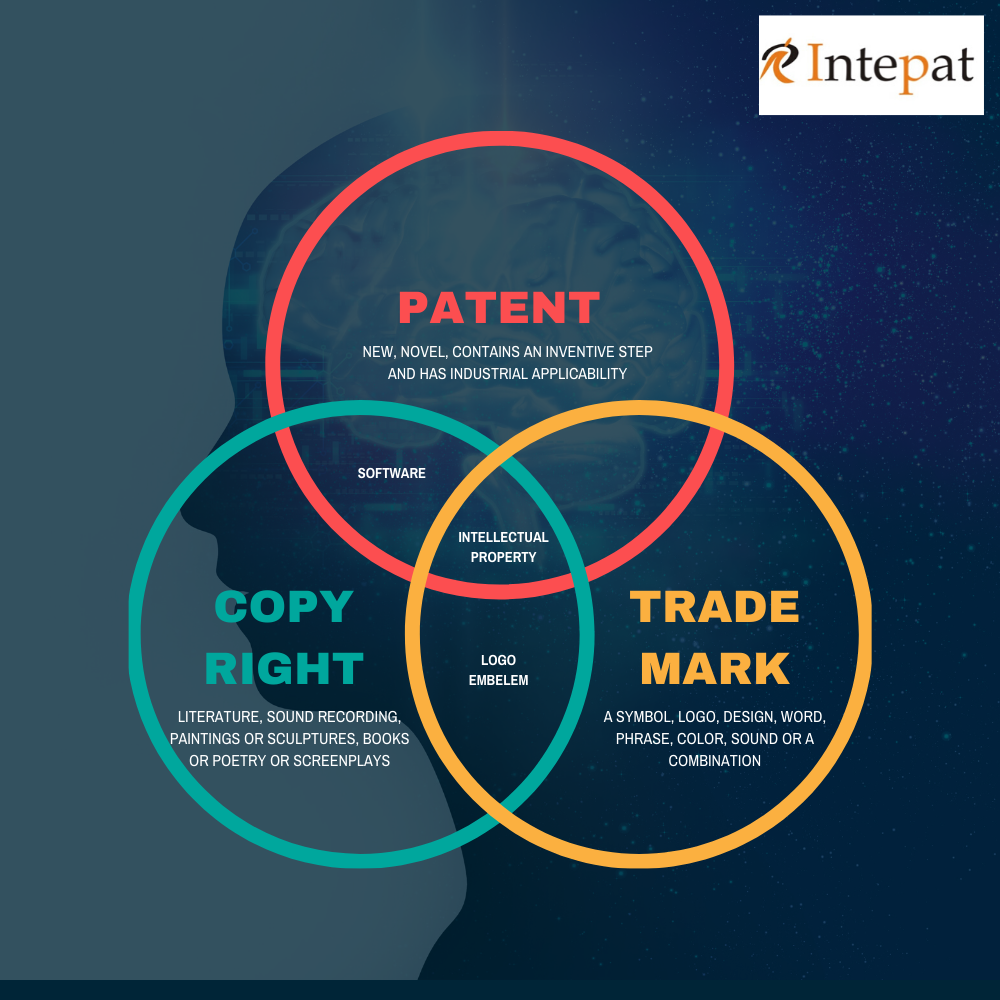
Understanding Intellectual Property for Startups: Your Essential Guide to Patents, Trademarks, and Copyrights
In the fast-paced world of startups, brilliant ideas are the currency of success. But what happens when your groundbreaking concept, your unique brand identity, or your innovative software code becomes public? Without proper protection, your most valuable assets could be copied, diluted, or even stolen, jeopardizing your entire venture.
This is where Intellectual Property (IP) comes into play. For startups, understanding and strategically managing IP isn’t just a legal formality; it’s a fundamental pillar of competitive advantage, a significant asset for valuation, and a critical safeguard against future challenges.
This comprehensive guide will demystify the core types of intellectual property – Patents, Trademarks, and Copyrights – and equip you with the knowledge to start building a robust IP strategy for your emerging business.
What is Intellectual Property (IP)? Why is it a Startup’s Superpower?
At its core, Intellectual Property refers to creations of the mind – inventions, literary and artistic works, designs, symbols, names, and images used in commerce. Unlike physical property (like a building or equipment), IP is intangible, yet it can be immensely valuable.
Think of IP as your startup’s secret sauce, its unique voice, or its innovative engine. It’s what sets you apart from competitors and often forms the very foundation of your business model.
Why IP is a Startup’s Superpower:
- Competitive Edge: Strong IP rights grant you exclusive control over your innovations and brand, making it harder for competitors to replicate your success.
- Asset for Valuation & Funding: Investors and potential acquirers scrutinize a startup’s IP portfolio. Robust patents, trademarks, and copyrights can significantly increase your company’s valuation and attractiveness for funding rounds.
- Revenue Generation: IP can be licensed or sold, creating additional revenue streams beyond your core product or service.
- Deterrent to Infringement: Registered IP rights give you legal standing to prevent others from using your innovations or brand without permission.
- Brand Protection & Trust: Trademarks, in particular, build brand recognition, trust, and loyalty among your customers.
- Freedom to Operate: Understanding your own IP and that of others helps you avoid infringing on existing rights, preventing costly legal disputes down the line.
Now, let’s dive into the "Big Three" types of IP that every startup founder needs to know.
1. Patents: Protecting Your Inventions
Imagine you’ve developed a revolutionary new gadget, a groundbreaking software algorithm, or an innovative manufacturing process. A patent is your legal shield, granting you the exclusive right to make, use, sell, and import your invention for a limited period, typically 20 years from the filing date.
What Patents Protect:
Patents protect inventions that are:
- New: Not previously known or used.
- Useful: Has a practical purpose.
- Non-obvious: Not apparent to someone skilled in the relevant field.
Types of Patents Relevant to Startups:
- Utility Patents: This is the most common type, protecting the functionality and how something works.
- Examples: A new type of engine, a pharmaceutical drug, a software algorithm (if it solves a technical problem in a novel way), a unique manufacturing process, an improved solar panel design.
- Design Patents: These protect the ornamental design or appearance of an article of manufacture. It’s about how something looks, not how it functions.
- Examples: The unique shape of a smartphone, the aesthetic design of a chair, the distinctive pattern on a fabric.
- Less Common for Startups: Plant Patents protect new varieties of asexually reproduced plants.
What Cannot Be Patented:
- Abstract ideas, laws of nature, natural phenomena.
- Scientific principles or mathematical formulas themselves.
- Purely aesthetic creations (these might be covered by design patents or copyrights).
- Inventions that are not new, useful, or non-obvious.
Why Get a Patent?
- Exclusive Monopoly: For the patent term, you have the sole right to commercialize your invention, giving you a significant head start.
- Licensing Opportunities: You can license your patented technology to other companies for a fee, creating passive income.
- Attract Investors: A strong patent portfolio signals innovation and defensibility to potential investors.
- Deter Competitors: Patented inventions create a barrier to entry for competitors.
The Simplified Patent Process:
- Idea & Research: Develop your invention and conduct a thorough patent search to ensure it’s truly new and non-obvious.
- Provisional Patent Application (Optional but Recommended): A lower-cost, simpler application that establishes an early filing date ("patent pending") for 12 months, allowing you to refine your invention and seek funding without losing your place in line.
- Non-Provisional Patent Application: A detailed and formal application, including claims, drawings, and a detailed description of the invention.
- Examination: A patent examiner reviews your application against existing patents and public knowledge. This often involves back-and-forth communication.
- Grant or Rejection: If successful, your patent is granted. If rejected, you may have opportunities to amend your application.
Key Takeaway for Startups: If your startup relies on a truly novel invention or technological breakthrough, a utility patent (or a design patent for unique aesthetics) should be a top priority. Be careful about publicly disclosing your invention before filing a patent application, as this can jeopardize its patentability.
2. Trademarks: Safeguarding Your Brand Identity
Your startup’s name, logo, slogan, and even unique sounds or colors are more than just identifiers; they are the heart of your brand. A trademark protects these elements, preventing others from using similar marks that could confuse consumers about the origin of goods or services.
What Trademarks Protect:
Trademarks protect words, names, symbols, designs, or any combination used to identify and distinguish the goods/services of one party from those of others.
- Examples:
- Company Names: Apple, Google, Nike
- Product Names: iPhone, Coca-Cola, Windows
- Logos: The Nike swoosh, the Apple bitten apple, the McDonald’s golden arches
- Slogans/Taglines: "Just Do It," "Think Different," "I’m Lovin’ It"
- Unique Sounds: The Netflix "Ta-Dum," the MGM lion roar
- Distinctive Colors/Shapes: Tiffany Blue, the shape of the Coca-Cola bottle (in some contexts)
Why Get a Trademark?
- Brand Recognition & Trust: A registered trademark builds consumer confidence and makes your brand easily identifiable.
- Prevent Confusion: It stops competitors from using similar names or logos that could mislead customers into thinking they’re buying from you.
- Valuable Asset: Your brand’s reputation, embodied by its trademarks, can be one of your most valuable business assets, attracting investors and increasing acquisition value.
- Legal Recourse: A registered trademark provides stronger legal grounds to enforce your rights against infringers.
Trademark vs. Business Name vs. Domain Name (A Common Confusion):
- Business Name Registration: Registers your company name with the state for legal and tax purposes. It doesn’t automatically give you exclusive rights to use that name as a brand identifier nationwide.
- Domain Name Registration: Secures your website address (e.g., yourcompany.com). It doesn’t grant you trademark rights.
- Trademark Registration: Grants you exclusive rights to use your brand name, logo, or slogan in commerce for specific goods/services, often nationwide.
You can have your business name registered, your domain name secured, but still not have trademark protection for your brand elements, leaving them vulnerable.
The Simplified Trademark Process:
- Trademark Search: Crucial first step. Conduct a comprehensive search to ensure your desired mark isn’t already in use or too similar to an existing one. This avoids costly conflicts later.
- Application Filing: File an application with the relevant intellectual property office (e.g., USPTO in the U.S.), specifying the goods and services your mark will cover.
- Examination: An examiner reviews your application for conflicts and adherence to trademark law.
- Publication: If approved, your mark is published for a period, allowing third parties to oppose its registration.
- Registration & Maintenance: If no opposition, your trademark is registered. You must actively use your mark and periodically renew its registration to maintain your rights.
Key Takeaway for Startups: Your brand identity is paramount. As soon as you have a clear name, logo, or slogan, conduct a trademark search and consider filing for registration. This is often one of the first IP steps a startup should take.
3. Copyrights: Protecting Original Works of Authorship
Have you written a blog post, designed a website, composed a jingle, or developed software code? Then you’ve likely created a work that is eligible for copyright protection. Copyright protects original works of authorship fixed in a tangible medium of expression.
What Copyrights Protect:
Copyright protects the expression of an idea, not the idea itself.
- Literary Works: Books, articles, software code, website content, poems, scripts.
- Musical Works: Songs, compositions, lyrics.
- Dramatic Works: Plays, screenplays.
- Pantomimes and Choreographic Works.
- Pictorial, Graphic, and Sculptural Works: Photographs, illustrations, designs, maps, blueprints.
- Motion Pictures and Other Audiovisual Works: Films, videos, television shows.
- Sound Recordings.
- Architectural Works.
Automatic Protection vs. Registration:
Unlike patents and trademarks, copyright protection arises automatically the moment an original work is created and "fixed" in a tangible form (e.g., written down, saved on a computer, recorded). You don’t need to register it to have basic copyright.
However, registering your copyright with the relevant government office (e.g., U.S. Copyright Office) offers significant advantages:
- Public Record: Creates a public record of your copyright claim.
- Ability to Sue for Infringement: You generally cannot file an infringement lawsuit until your copyright is registered.
- Statutory Damages & Attorney’s Fees: If registered prior to infringement (or within a certain window), you may be entitled to higher statutory damages and recover attorney’s fees, making it more financially viable to pursue infringers.
- Evidence in Court: Registration serves as prima facie evidence of the validity of the copyright.
What Cannot Be Copyrighted:
- Ideas, Procedures, Methods, Systems, Concepts: Copyright protects the expression of an idea, not the idea itself.
- Facts or Data: (e.g., the factual content of a news report, a phone book listing).
- Names, Titles, Slogans, Short Phrases: These are usually too short or generic to be considered original works of authorship (though they may be protectable as trademarks).
- Works consisting entirely of common property with no original authorship.
Key Takeaway for Startups: If your startup’s core offering involves original content, software, or creative designs, copyright is crucial. While automatic, registering key copyrights (especially for software, critical website content, or marketing materials) is a smart move for stronger enforcement capabilities.
Beyond the Big Three: Other Important IP Considerations
While patents, trademarks, and copyrights are the cornerstones, other forms of IP also play a vital role for startups:
- Trade Secrets: Confidential business information that provides a competitive edge and is kept secret. This can include customer lists, proprietary formulas (like the Coca-Cola recipe), manufacturing processes, or marketing strategies.
- Key Difference from Patents: Trade secrets offer indefinite protection as long as they remain secret. There’s no registration process, but you must actively take reasonable steps to maintain their secrecy (e.g., NDAs, limited access). If the secret becomes public, protection is lost.
- Non-Disclosure Agreements (NDAs) / Confidentiality Agreements: Legal contracts that protect confidential information shared between parties. Essential when discussing your ideas with potential investors, partners, or employees before formal IP protection is in place.
- Domain Names: While not IP in themselves, your domain name is crucial for your online presence and often ties directly to your trademarked brand name. Secure relevant domain names early.
Developing Your Startup’s IP Strategy: A Proactive Approach
Ignoring IP until a problem arises is a common and costly mistake for startups. Instead, adopt a proactive IP strategy:
- Early Assessment is Key: As soon as you have a solid concept, identify what aspects of your business are truly unique and valuable.
- What are your inventions? (Potential patents)
- What is your brand identity? (Potential trademarks)
- What creative works do you produce? (Potential copyrights)
- What proprietary information gives you an edge? (Potential trade secrets)
- Conduct Searches: Before investing heavily, perform thorough searches for existing patents, trademarks, and domain names to avoid conflicts and identify "white space" for your innovations.
- Prioritize & Budget: You might not be able to protect everything at once. Prioritize the most critical IP assets based on their value, competitive impact, and cost. Allocate a budget for IP protection.
- Employee & Contractor Agreements: Ensure all employees and contractors sign agreements assigning IP created during their work to the company. This prevents future ownership disputes.
- Maintain Secrecy: For trade secrets, implement robust internal controls to keep sensitive information confidential.
- Monitor & Enforce: Keep an eye out for potential infringers and be prepared to defend your IP rights if necessary.
- Regular IP Audits: Periodically review your IP portfolio to ensure it aligns with your business goals and identify new protectable assets.
Common IP Mistakes Startups Make
- Public Disclosure Too Early: Disclosing an invention before filing a patent application can make it impossible to get a patent.
- Not Conducting Proper Searches: Launching a brand or product without checking for existing trademarks or patents can lead to costly rebranding or infringement lawsuits.
- Assuming Automatic Protection is Enough: While copyright is automatic, registration offers far stronger enforcement power. For trademarks, registration is crucial for nationwide protection.
- Ignoring Employee IP Assignments: Failing to get employees to assign IP rights to the company can lead to disputes over who owns what.
- Underestimating IP Value: Viewing IP solely as a legal expense rather than a valuable business asset.
- Not Seeking Expert Advice: IP law is complex. Relying solely on DIY approaches can lead to critical errors.
Conclusion: Protect Your Innovation, Propel Your Growth
In the dynamic startup ecosystem, intellectual property is not just a legal concept; it’s a strategic asset that fuels innovation, secures investment, and protects your hard-earned competitive advantage. By understanding the fundamentals of patents, trademarks, and copyrights, and by proactively developing a comprehensive IP strategy, you can transform your ideas into defensible assets that drive long-term success.
Don’t wait until it’s too late. Start thinking about your IP from day one. While this guide provides a strong foundation, the world of intellectual property is intricate. Always consult with a qualified intellectual property attorney to tailor an IP strategy specific to your startup’s unique needs and ensure your innovations are adequately protected. Your future success might just depend on it.



Post Comment